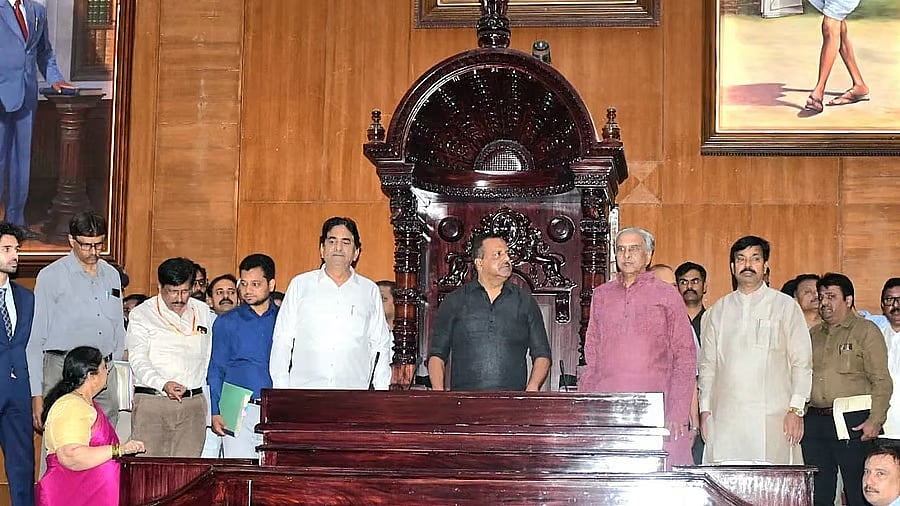
Assembly speaker U T Khader and Council chairman Basavaraj Horatti inspect the Assembly hall during a meeting to review preparations for the upcoming winter session of the legislature, at the Suvarna Vidhana Soudha in Belagavi on Wednesday.
Credit: Special Arrangement
The upcoming winter session of the Karnataka legislature in Belagavi, from December 8 to 19, will once again be held under a shadow of unrealised promise. The Suvarna Vidhana Soudha has rarely given voice to the concerns, aspirations, and long-neglected needs of the people of North Karnataka. Inaugurated in 2012 with the promise of decentralisation and regional balance, it was meant to be more than a grand monument to Karnataka’s unity or a symbol in the border dispute with Maharashtra.
For a neglected region, it embodied the hope that, at least for a few weeks each year, the state’s leadership would listen to and act on its long-ignored grievances. More than a decade later, that promise remains largely unrealised. Instead of emerging as a second centre of governance, the building has acquired the reputation of a vast complex that stirs to life for barely 10-12 days before falling silent again. Key government departments that were supposed to shift there permanently have remained in Bengaluru, the presence of ministers is thin, and many officers treat the Belagavi sitting as an obligatory exercise rather than a serious legislative assignment.
As a result, the most pressing issues of North Karnataka rarely receive the attention they deserve. The region continues to lag in per capita income, industrial investment, irrigation, healthcare, and education. Large parts are still trapped in multidimensional poverty. Farmers in the Krishna and Mahadayi basins face chronic irrigation deficits, rural drinking water shortages persist, and infrastructure gaps in roads, rail connectivity, logistics, and administrative presence remain stark.
It is in this context that the stand taken by JD(S) MLA Sharanagouda Kandakur has resonated across the region. His decision to forgo allowances, official accommodation, and food during the Belagavi session calls out a culture of complacency. It underscores how the annual ritual has degenerated into an expensive ‘two-week excursion’, consuming Rs 25-30 crore without delivering major progress.
For the winter session to regain its legitimacy, the presiding officers should dedicate specific days exclusively to discussions on the region. A structured agenda – focusing on irrigation, industries, farmer distress, drinking water challenges, regional infrastructure, and overall development – would ensure that the session finally fulfils its purpose.
Belagavi was chosen to house the Suvarna Vidhana Soudha to correct long-standing imbalances. Without a committed legislative agenda, that promise risks becoming an empty gesture. This December presents another opportunity for the state to rectify this historic blunder by finally giving North Karnataka the attention it has long demanded.
